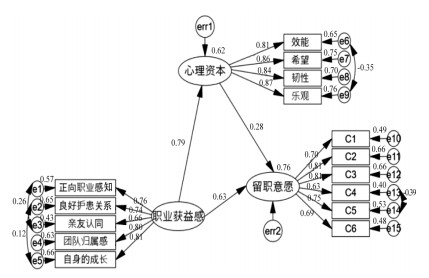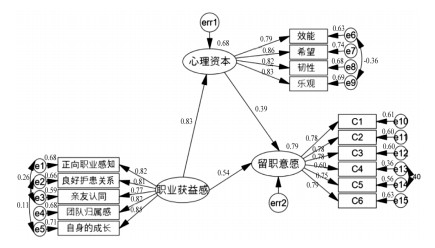Gender-different correlation of perceived professional benefits, psychological capital and intention to remain employed of nurses in 20 general hospitals in Guangdong Province
-
+ English摘要:目的 分析不同性别护士留职意愿现况和影响因素,为改进管理方式、提高护士留职率提供科学依据。方法 采用护士职业获益感、心理资本、留职意愿调查量表对广东省20家综合医院的421名护士实施调查,应用结构方程模型分析获益感、心理资本和留职意愿间的直接、间接及因果关系。结果 护士职业获益感总分为(4.10 ±0.61)分,各维度得分从高到低依次为良好护患关系、自身的成长、团队归属感、亲友认同、正向职业感知。心理资本总分为(3.94 ±0.60)分,各维度得分从高到低依次为效能、韧性、乐观、希望。留职意愿得分为(3.64 ±0.72)分。男性护士的留职意愿低于女性护士(P < 0.05)。男性护士的职业获益感总分,正向职业感知、良好护患关系、自身的成长3个维度得分低于女性护士(P < 0.05),男性护士的心理资本总分及其各维度得分与女性护士差异无统计学意义(P > 0.05)。Amos 25.0建立的结构方程模型显示,职业获益感正向影响心理资本(P < 0.05),男性护士职业获益感对心理资本的正向作用稍高于女性护士。心理资本正向影响留职意愿(P < 0.05),女性护士职业获益感对留职意愿的直接正向作用高于男性护士。在职业获益感对留职意愿的影响中,心理资本存在中介作用(P < 0.01)。男性护士心理资本的中介作用为0.324,女性护士为0.221。结论 男女护士的心理资本均较低,留职意愿欠佳,以男性护士更甚。不同性别护士的职业获益感、心理资本、留职意愿之间相互影响的程度不同,医院管理者应充分考虑护士的性别差异,分别制定相关干预措施,提高护士留职意愿。
-
-
图 1 女性护士结构方程模型拟合结果
注: 该模型卡方自由度比(χ2/df)= 1.697,残差均方和平方根(root mean square residual,RMR)= 0.030,近似均方根误差(root mean square error approximation,RMSEA)= 0.051,拟合优度指数(goodness-of-fit index,GFI)= 0.931,赋范拟合指数(normal fit index,NFI)= 0.946,成长配适指数(incremental fit index,IFI)= 0.977,刘易斯指数(Tucker-Lewis index,TLI)= 0.971,配适度指数(comparative fit index,CFI)= 0.977;模型图显示的数据仅保留2位小数。
表 1 男女护士职业获益感、心理资本、职业获益感对比 (
x±s ,分)分组 男性护士
(n = 157)女性护士
(n = 264)t值 P值 护士职业获益感 4.01 ± 0.62 4.15 ± 0.60 2.287 0.023 正向职业感知 3.81 ± 0.72 3.99 ± 0.73 2.459 0.015 良好护患关系 4.19 ± 0.62 4.33 ± 0.61 2.263 0.024 亲友认同 3.93 ± 0.69 4.02 ± 0.70 1.283 0.201 团队归属 4.03 ± 0.72 4.16 ± 0.62 1.957 0.051 自身的成长 4.13 ± 0.62 4.27 ± 0.61 2.263 0.024 护士心理资本 3.93 ± 0.64 3.95 ± 0.58 0.329 0.742 效能 4.05 ± 0.65 4.07 ± 0.58 0.327 0.744 希望 3.83 ± 0.73 3.83 ± 0.68 0.000 0.999 韧性 3.94 ± 0.73 3.96 ± 0.62 0.299 0.765 乐观 3.87 ± 0.89 3.91 ± 0.85 0.459 0.647 护士留职意愿 3.13 ± 0.67 3.95 ± 0.58 13.229 0.000 表 2 男女护士在各影响路径中的差异对比
分组 路径关系路径系数 未标准化路径系数 标准化 SE值 CR值 P值 男性
护士职业获益感→
心理资本0.870 0.825 0.096 9.036 < 0.01 职业获益感→
留职意愿0.824 0.535 0.187 4.411 < 0.01 心理资本→
留职意愿0.575 0.393 0.168 3.429 < 0.01 女性
护士职业获益感→
心理资本0.939 0.785 0.098 9.599 < 0.01 职业获益感→
留职意愿1.093 0.632 0.181 6.023 < 0.01 心理资本→
留职意愿0.407 0.281 0.123 3.295 < 0.01 表 3 男女护士在模型中总作用、直接作用与中介作用比较
分组 影响关系 总作用 直接作用 中介作用 男性护士 职业获益感→心理资本 0.825 0.825 0.324 职业获益感→留职意愿 0.859 0.535 心理资本→留职意愿 0.393 0.393 女性护士 职业获益感→心理资本 0.785 0.785 0.221 职业获益感→留职意愿 0.853 0.632 心理资本→留职意愿 0.281 0.281 -
[1] WHO. State of the world's nursing 2020: investing in education, jobs and leadership[R/OL]. (2020-04-07)[2021-03-31]. https://www.who.int/publications/i/item/9789240003279.
[2] 方鹏骞. 中国医疗卫生事业发展报告2015——中国公立医院改革与发展专题[M]. 北京: 人民出版社, 2016: 324-326. [3] 汪淼芹, 李德芳, 汪爱茹. 本科男护生就业后生活满意度及其影响因素研究[J]. 护理学杂志, 2011, 26(5): 68-70. doi: 10.3870/hlxzz.2011.05.068 [4] 李梦琦, 郑晶, 刘可, 等. 男性护士工作满意度对其留职意愿的影响分析[J]. 中国护理管理, 2016, 16(12): 1685-1689. https://www.cnki.com.cn/Article/CJFDTOTAL-GLHL201612025.htm [5] 钱英, 王晓蕾, 方晓眉, 等. 护士心理资本和工作满意度与留职意愿的关系研究[J]. 上海交通大学学报(医学版), 2015, 35(6): 887-891. https://www.cnki.com.cn/Article/CJFDTOTAL-SHEY201506026.htm [6] 肖晓玲, 张东华, 胡秋秋, 等. 护士职业获益感的质性研究[J]. 护理学杂志, 2014, 29(2): 41-43. doi: 10.3870/hlxzz.2014.02.041 [7] 胡菁, 刘晓虹. 护士职业获益感问卷的编制及其信效度检验[J]. 解放军护理杂志, 2013, 30(22): 1-7. doi: 10.3969/j.issn.1008-9993.2013.22.001 [8] 骆宏, 赫中华. 心理资本问卷在护士群体中应用的信效度分析[J]. 中华医学行为与脑科学杂志, 2010, 19(9): 853-854. [9] 陶红, 王琳. 中文版护士留职意愿问卷的修订[J]. 第二军医大学学报, 2010, 31(8): 925-927. https://www.cnki.com.cn/Article/CJFDTOTAL-DEJD201008034.htm [10] CAHALIN L P. Job strain and older workers: can a reduction in job strain help to eliminate the social security drain?[J]. Work, 2009, 33(1): 3-12. doi: 10.3233/WOR-2009-0838
[11] 焦念涛, 郑向敏. 酒店实习生心理资本对留职意愿的影响: 满意度和组织支持感的作用研究[J]. 旅游学刊, 2019, 34(2): 106-119. https://www.cnki.com.cn/Article/CJFDTOTAL-LYXK201902015.htm [12] 章馨曼, 章雅青, 温弗乐, 等. 三级医院护士留职意愿现况的调查研究[J]. 解放军护理杂志, 2019, 36(11): 46-49. doi: 10.3969/j.issn.1008-9993.2019.11.012 [13] 刘玉玲, 李星梅, 马嫦梅. 不同层级护士职业认同和职业获益感的差异研究[J]. 护理管理杂志, 2017, 17(16): 444-446. https://www.cnki.com.cn/Article/CJFDTOTAL-HLGL201706029.htm [14] 刘卓, 尚文涵, 王兰, 等. 三甲医院临床护士心理资本现状及其影响因素的研究[J]. 中华现代护理杂志, 2016, 22(30): 4326-4330. doi: 10.3760/cma.j.issn.1674-2907.2016.30.008 [15] 胡菁, 刘晓虹. 护士职业获益感对职业倦怠的影响研究[J]. 护理研究, 2016, 30(1): 160-163. https://www.cnki.com.cn/Article/CJFDTOTAL-SXHZ201602012.htm [16] LWIN P M, RATTANAPAN C, LAOSEE O. Nurses' intention to remain employed in hospitals: understanding the shortage in the context of Myanmar[J]. Int J Nurs Pract, 2017, 23(4): e12536. doi: 10.1111/ijn.12536
[17] LUTHANS F, YOUSSEF C M., AVOLIO B J. 心理资本[M]. 李超平, 译. 北京: 中国轻工业出版社, 2008: 1. [18] 郭兵妹, 朱爱芳. 三甲医院护士心理资本及心理契约和工作投入水平的相关性分析[J]. 中华劳动卫生职业病杂志, 2018, 36(8): 614-617. doi: 10.3760/cma.j.issn.1001-9391.2018.08.013 [19] LUTHANS K W, LEBSACK S A, LEBSACK R R. Positivity in healthcare: relation of optimism to performance[J]. J Health Organ Manag, 2008, 22(2): 178-188. doi: 10.1108/14777260810876330
[20] 肖晓玲, 张东华, 熊丽萍, 等. 护士职业获益感对留职意愿影响的研究[J]. 中国护理管理, 2016, 16(4): 468-472. https://www.cnki.com.cn/Article/CJFDTOTAL-GLHL201604011.htm [21] 陈登宏. 护士职业获益感在职业生涯成功感与职业承诺的中介效应[J]. 护理学报, 2019, 26(2): 71-75. https://www.cnki.com.cn/Article/CJFDTOTAL-NFHL201902018.htm [22] KRET M E, DE GELDER B. A review on sex differences in processing emotional signals[J]. Neuropsychologia, 2012, 50(7): 1211-1221. doi: 10.1016/j.neuropsychologia.2011.12.022
[23] LI X, KAN D, LIU L, SHI M, et al. The mediating role of psychological capital on the association between occupational stress and job burnout among bank employees in China[J]. Int J Environ Res Public Health, 2015, 12(3): 2984-3001. doi: 10.3390/ijerph120302984
[24] JOHNSON-SINGH C M, ROSTILA M, PONCE DE LEON A, et al. Ethnic heterogeneity, social capital and psychological distress in Sweden[J]. Health Place, 2018, 52(7): 70-84. http://www.onacademic.com/detail/journal_1000040416314910_3533.html






 下载:
下载:

